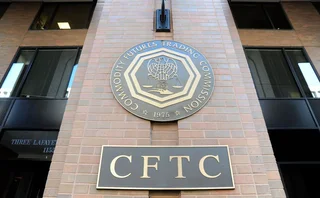
US Treasury would support future SEC/CFTC merger, hints Geithner
Plans to merge the Securities and Exchange Commission (SEC) with the Commodity Futures Trading Commission (CFTC) could still be realised in the longer term, despite the decision by US authorities not to pursue such measures as part of their current regulatory overhaul.
Testifying before the Senate Committee on Banking, Housing and Urban Affairs yesterday on the Obama administration's new regulatory reform proposals, Treasury secretary Timothy Geithner acknowledged that merging the two entities has been debated in the past and that valid reasons still exist for doing so, although this is not the time to take that step.
"Congress has considered many times in the past proposals for merging both entities and there is a simple and compelling rationale for doing that. What we propose is to begin by bringing the underlying statutes - which are substantially different for [financial] products with similar attributes - into conformity. We think that helps solve most of the substantive problems that exist by having separate regulation of securities and futures; it won't solve all of them, but it is a necessary step toward any effort to merge [the SEC and CFTC] and we think that is a good challenge to take on right now," said Geithner.
The Treasury secretary was responding to questions from senator Jon Tester, who welcomed proposals to consolidate the Office of Thrift Supervision and the Office of the Comptroller of the Currency into a new National Bank Supervisor, but queried why the similar consolidation of the SEC and CFTC was not included in the regulatory reform white paper released on June 17.
When Tester further probed the secretary's willingness to recommend a merger of the two agencies in the future, Geithner appeared amenable to the suggestion - even hinting that his office would attempt to persuade Congress into such action.
"I don't anticipate [recommending a merger] now, but that is something the Congress has considered many times in the past and I would expect that to be one of the things that Congress reflects on now, with appropriate leadership, suggestion, help [and] persuasion from our office,' he added.
The primary political obstacle to such a merger is the intransigence of both the Congressional committees that oversee the agencies. Neither the House Committee on Financial Services, which monitors the SEC, nor the House Agriculture Committee, which has jurisdiction over the CFTC, are willing to surrender any supervisory authority over derivatives markets.
The white paper proposes that the CFTC and the SEC "should make recommendations to Congress for changes to statutes and regulations that would harmonise regulation of futures and securities". If an agreement cannot be reached, the matter will be referred to the new Financial Services Oversight Council.
Even if jurisdictional conflicts can be settled amicably by the two agencies - and such agreement is regarded by the Treasury as the first step toward merging the bodies - valid arguments exist for the continued existence of both entities as independent offices.
"The notion of a merger of the CFTC and the SEC has looked unlikely for some time and although there would be operational efficiencies by merging the two, they still fulfil distinct roles and operate in distinct fashions - the CFTC is a market protection-focused principles-based regulator while the SEC is a rules-based supervisor and concerned primarily with investor protection," noted Carolyn Jackson, counsel in the regulatory, funds and financial products group at law firm Allen & Overy in London.
See also: Obama reform plans show no progress on OTC derivatives clearing
Merge SEC and CFTC, says former SEC commissioner
Gensler voted in as CFTC chairman
Only users who have a paid subscription or are part of a corporate subscription are able to print or copy content.
To access these options, along with all other subscription benefits, please contact info@risk.net or view our subscription options here: http://subscriptions.risk.net/subscribe
You are currently unable to print this content. Please contact info@risk.net to find out more.
You are currently unable to copy this content. Please contact info@risk.net to find out more.
Copyright Infopro Digital Limited. All rights reserved.
As outlined in our terms and conditions, https://www.infopro-digital.com/terms-and-conditions/subscriptions/ (point 2.4), printing is limited to a single copy.
If you would like to purchase additional rights please email info@risk.net
Copyright Infopro Digital Limited. All rights reserved.
You may share this content using our article tools. As outlined in our terms and conditions, https://www.infopro-digital.com/terms-and-conditions/subscriptions/ (clause 2.4), an Authorised User may only make one copy of the materials for their own personal use. You must also comply with the restrictions in clause 2.5.
If you would like to purchase additional rights please email info@risk.net
More on Regulation
Driving IT resilience through managed services
How Murex is supporting financial institutions with managed services and providing strategic solutions
US Basel equivalence questioned as EU patience wears thin
MEPs say unfaithful US implementation of Basel III could trigger review of access to EU markets
The Term €STR transition: challenges and market readiness
The progress, challenges and factors shaping the adoption of Term €STR as financial institutions transition from Euribor
CFTC takes red pen to swaps rules, but don’t call it a rollback
Lawyers and ex-regs say agency is fine-tuning and clarifying regulations, not eliminating them
EU edges closer to calming FRTB fund-linked fray
Dealers say temporary solution is a step in the right direction but won’t fully resolve all issues
European Commission changes tune on proposed FRTB multiplier
Banks fear departure from original diversification factor undermines case for permanent relief
Supervisors should be mindful of geopolitical risks, says IMF
Shock events cause sizeable swings in asset pricing, institution’s latest report highlights
Bowman won’t commit to stress-testing the tariff shock
Nominated Fed vice-chair stonewalls calls to run ad hoc scenario similar to 2020 Covid test







